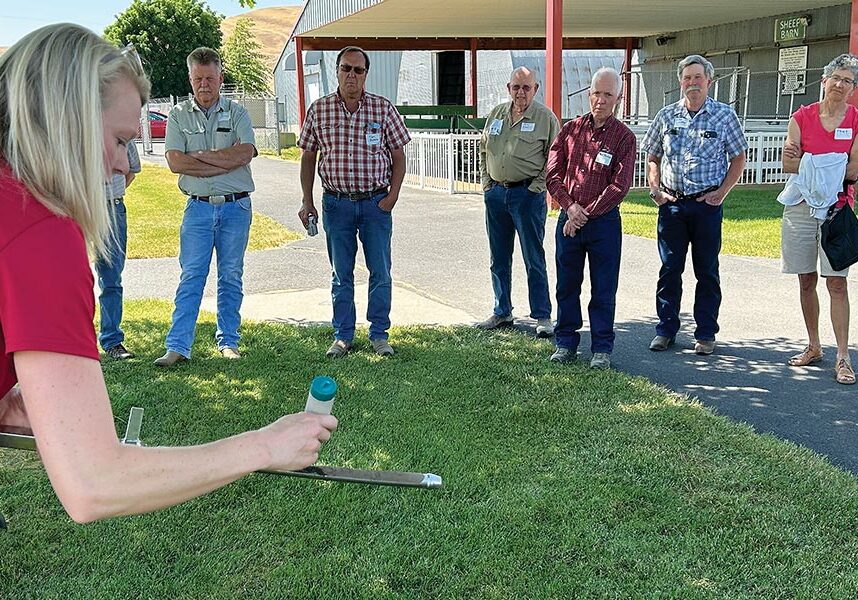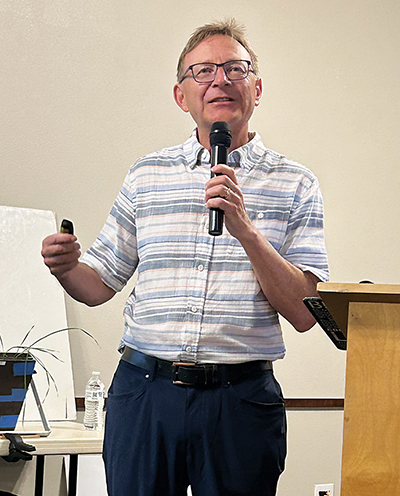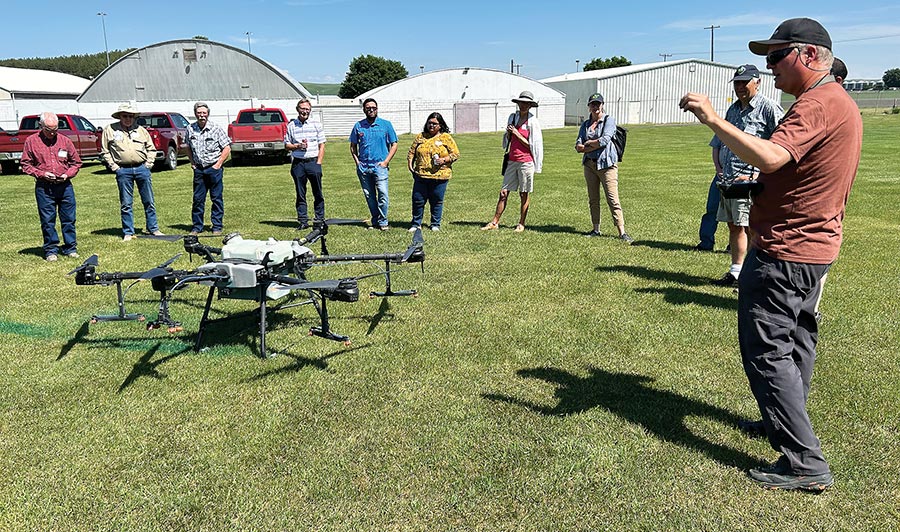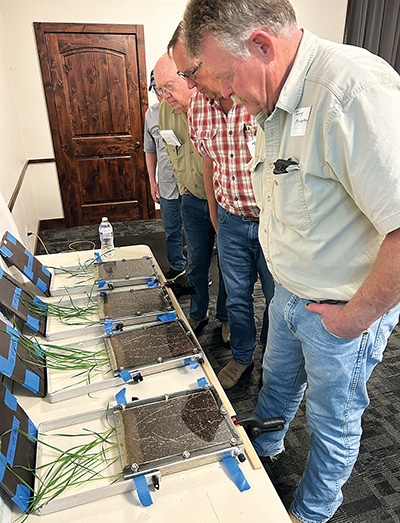
In agronomy, context is key. That was the message growers heard from Ted Labun at the 2023 Wheat College last month in Colfax, Wash.
Labun is the owner of TLC Agronomics Inc., a consulting company based in Calgary, Alberta, that works with producers to grow successful crops by incorporating best agronomic and management practices. He spent 19 years as a field biologist focusing on pest control in cereals, pulses, and canola, followed by 21 years as a technical lead supporting seed treatment technology in western Canada.

“Agronomy has a key role in making wheat production sustainable. What we say works on this farm may not work on another farm,” he told attendees, adding that agronomy doesn’t necessarily mean growers have to spend more money. “Maybe look at where you are investing. Is there a way to get a better return?”
Labun listed four things that influence agronomic practices in wheat: Growing conditions, such as temperature and rainfall; crop rotations; soil management; and pests. Although growers should be the drivers of good agronomy, they need help from a strong science community that includes good breeding and research programs, as well as hands-in-the-field help from consultants or Extension.
“Agronomy is always changing, evolving and putting agronomy into context is important,” he said. “Those that have been farming for 30-plus years have a lot of experience and knowledge, a lot of common sense.”
Labun compared agronomic practices between three farms in the Canadian prairies — in Manitoba, Saskatchewan, and Alberta — who plant nearly 50% of their farm to spring wheat. He also touched on the sustainable management of pests, saying the goal isn’t to eliminate pests, but to minimize the damage they cause using agronomic practices, such as crop rotations, residue management, seed treatments, seeding depth, row spacing, timing of chemical applications, and crop competition.
To summarize his presentation:
- Agronomy is based on science and technology.
- Agronomy is integrated and practical.
- Agronomy is continuing to evolve and improve.
- Agronomy must be put into context.
- Agronomy should be grower driven, i.e., challenges should drive solutions.
- The science community is critical for success.
- Agronomy must include farm safety — the grower is the most important asset on the farm.
Industry updates
Following Labun’s presentation, Ben Barstow, chairman of the Washington Grain Commission (WGC), and Andy Juris, president of the Washington Association of Wheat Growers (WAWG), gave industry updates.
The WGC is preparing for a summer full of trade teams with seven expected through October. Barstow said demand for club wheat is growing in Asia as it is a key ingredient in cakes popular with tourists.
“So as tourism picks up, so does demand for club wheat,” he said. He added that barley acreage is up this year, a trend he hopes to see continue.
Juris reviewed some of the state legislative issues that WAWG tackled this year, including a voluntary, bipartisan riparian buffer bill, a seasonal exemption for agricultural overtime, and the lack of a mechanism to exempt on-farm fuel from surcharges related to the state’s cap-and-trade program.
“In the majority party, there is an increasing lack of concern for issues that face Eastern Washington,” Juris said. “It’s something we continue to face. We try to partner as much as we can with legislators on the west side, and we have found some common ground, but it’s a frustrating environment to deal with. We will continue to work to keep issues in front of legislators, many of whom have no connection to ag.”
WAWG has also been active advocating for the lower Snake River dams and is participating in farm bill discussions.
Juris encouraged growers to get active in their county grower groups and to contact state and federal legislators on issues.
“Nothing gets moved when we all stay home. Being a voice for your industry is more important than ever,” he said. “What kind of future do you want? The future we want will never happen if we all stay home.”

Wheat now and in the future
Wheat College’s second half started with a presentation by Aaron Esser, regional Washington State University (WSU) Extension specialist and manager of WSU’s Wilke Research and Extension farm in Davenport, Wash.
“We are at a pivotal road in farming,” he said, pointing out that fertilizer costs are up 140%, Roundup costs are up 190%, and diesel fuel costs are up 92%. “The 2023 crop will be the single most expensive wheat crop harvest in Washington state.”
Growers are facing volatile markets, environmental stress, and weed pressure. While the markets and environment are mostly out of growers’ control, they do have some control in relation to resistant weeds. He gave updates on research being done on reducing annual grassy weed pressure and enhanced broadleaf and grassy weed control during fallow periods. Esser encouraged growers to think of a field and name the three worst weeds in it. Then figure out:
- What crops were grown in that field in the previous four years.
- What crops are planned for that field for the next four years.
- List three things that can be done differently (this may take some outside-the-box thinking, such as some tillage in a no-till practice).
“What you did in the past dictated the situation you are in, so what are you going to do differently?” he asked growers. “The solution is having a plan and knowing what you are going to do now and in the future, but you need to be flexible.”
Hands-on

Wheat College closed out with three, hands-on rotational topics. Ric Wesselman, integrated account lead and seedcare specialist with Syngenta Crop Protection, talked about the role roots play in the establishment of a crop, what impacts root development, and how roots can save on input costs.
“What’s going on underneath the ground is becoming more and more important, and that investment, your last investment in the year, is probably your most important,” he said, referring to seed treatments.
Rachel Wieme, WSU regional Extension agronomist, talked about soil pH testing. She used a portable pH meter to show how soil pH can change depending on where the testing is done in a soil core sample.
Finally, Bill Kuper, founder and chief pilot at Ag Drones Northwest, explained how drones are becoming more popular in agriculture for mapping and spraying and gave a drone demonstration.












